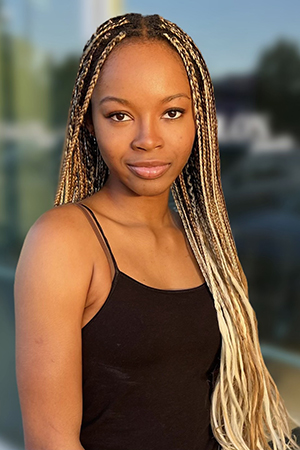November 26, 2025
By Tracie Troha
Chelsea Ekwegh, a fourth-year mechanical engineering student in the George W. Woodruff School of Mechanical Engineering, has made it her mission to reshape how cities think about energy. After being selected for the 2025 Millennium Fellowship, a prestigious leadership development program that supports student-led projects advancing the United Nations Sustainable Development Goals, she is tackling the challenge of helping cities transition toward clean, efficient, and equitable energy systems.
The fellowship, a joint initiative of the United Nations Academic Impact and the Millennium Campus Network, empowers undergraduates around the world to design and lead social impact projects.
Ekwegh’s project, titled Bridging Energy Infrastructure for Sustainable Urban Development, explores ways to connect new and old technologies so cities can evolve without leaving people or infrastructure behind.
Her inspiration for the project comes from her experience growing up in Nigeria, where power outages and generator pollution were a daily challenge.
“Those experiences taught me how vital reliable electricity is to daily life and opportunity,” Ekwegh said. “Coming to the United States, I saw how consistent energy and organized infrastructure empower communities, but also that even advanced systems face challenges from rising demand, climate change, and aging networks.”
These experiences shaped her passion for sustainable engineering.
“I believe true innovation lies in improving and adapting what already exists to meet new realities, ensuring that our cities remain resilient, inclusive, and capable of providing reliable energy for all,” Ekwegh said.
Ekwegh’s Millennium Fellowship project explores how renewable technologies such as solar-powered electric vehicle charging and smart public transportation lighting can work alongside Atlanta’s traditional energy systems. Her work will include case studies, interviews, and on-site assessments to identify opportunities for improvement.
Partnership is key to Ekwegh’s project. She plans to collaborate with Georgia Tech faculty and students in engineering, environmental science, and urban planning to develop practical ideas for cleaner urban energy systems. She also intends to work with Atlanta’s sustainability and resilience offices, energy organizations, and community leaders to understand real infrastructure needs.
“Through collaboration, I aim to learn how to translate ideas into tangible community solutions while gaining experiences that guide my academic path toward energy systems and urban infrastructure research,” Ekwegh said. “Ultimately, the Fellowship will shape my career goal of developing sustainable and equitable technologies that help growing cities thrive.”
Looking ahead, Ekwegh sees the Millennium Fellowship as a transformative experience. She hopes her work will encourage others at Georgia Tech to think about sustainability as improving what already exists.
“I hope this project leaves a lasting foundation at Georgia Tech and beyond, one where existing urban energy infrastructure is strengthened and redesigned alongside renewable energy innovations,” Ekwegh said. “I want to establish a culture of bridging legacy systems with future-ready solutions, making cities more resilient, inclusive and sustainable.”

